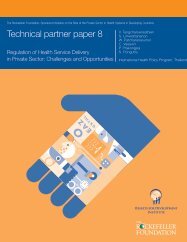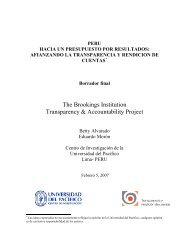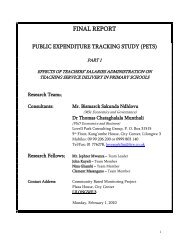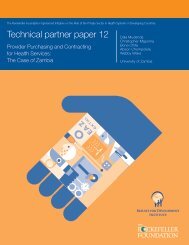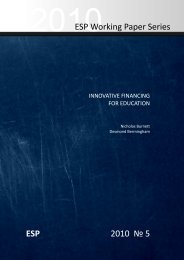Innovative Secondary Education For Skills Enhancement
Innovative Secondary Education For Skills Enhancement
Innovative Secondary Education For Skills Enhancement
Create successful ePaper yourself
Turn your PDF publications into a flip-book with our unique Google optimized e-Paper software.
The Informal Economy 10<br />
The informal economy cannot be considered a temporary<br />
phenomenon, having grown steadily in most developing<br />
countries in both rural and urban areas. It is particularly<br />
important for women, who overwhelmingly work in it.<br />
A review of skill needs for the informal economy was<br />
conducted, including a detailed look at four countries<br />
(Cambodia, India, Kenya, and Senegal). All four are transitioning<br />
from agriculture to manufacturing and servicebased<br />
economies, both of which remain largely informal,<br />
although at very different paces. In India, for example,<br />
street vendors, home-based workers producing and<br />
packaging for small retailers, and construction workers are<br />
among the most common informal economy jobs. All four<br />
countries are also increasingly globalized and as such require<br />
improved technical and second-language education.<br />
In the informal economy, cognitive, non-cognitive and<br />
technical skills are all important. However, non-cognitive<br />
skills may be even more important in the informal than in<br />
the formal economy—most informal workers are self-employed<br />
and thus need to be able to work along the entire<br />
value chain, running their own businesses. This requires<br />
non-cognitive skills such as discipline, confidence, negotiation,<br />
communication, and decision making. It also requires<br />
entrepreneurial and business skills, such as financial<br />
management, market research, and marketing. Informal<br />
economy workers need to be more self-reliant than formal<br />
economy ones. Detailed analyses of construction workers<br />
in India and expert interviews in Kenya particularly<br />
confirm this. Compare, for example, skilled and unskilled<br />
construction workers in India.<br />
In Kenya, as one expert put it when interviewed, “there<br />
is a competency gap between what employers look for<br />
and what skills youth have; the skills most needed by the<br />
informal economy are life skills and business skills.” In<br />
Kenya’s informal agricultural and manufacturing sectors,<br />
there is a need for more technical skills, while street vendors<br />
need more business skills.<br />
In general, informal workers have low education levels<br />
and therefore weak cognitive skills. Most informal workers<br />
do not have a secondary education; those who do have<br />
not acquired the crucial non-cognitive skills. In general,<br />
indeed, countries have made little progress promoting<br />
programs to develop non-cognitive skills.<br />
The primary training available to informal workers is<br />
through apprenticeships that are not connected to the<br />
school system and are much more significant. In Senegal,<br />
for instance, in 2007 some 10,000 young people were<br />
enrolled in TVET programs while the motor repair sector<br />
alone had 440,000 apprentices. However, apprenticeships<br />
have major limitations as they may be too practical<br />
(whereas TVET programs may be too theoretical); an<br />
appropriate integration of theory and practice is required<br />
in both. Apprenticeships may also insufficiently address<br />
non-cognitive skills, as the apprentice masters may or may<br />
not themselves have such skills and are certainly not likely<br />
to teach them automatically. Indeed, the 2012 Triennale<br />
on <strong>Education</strong> and Training in Africa stressed that priority<br />
must be given to raising the skill levels of master craftsmen<br />
in the informal sector, as it is estimated that they<br />
train 90 percent of youth who enter the labor market.<br />
An important question beyond skills for the informal<br />
economy has to do with skills needed to transform the informal<br />
economy into the formal one. This is relatively unexplored<br />
territory and of course involves many topics that<br />
are beyond this paper’s focus on skills. Nonetheless, the<br />
premium on non-cognitive skills for the informal economy<br />
does raise intriguing questions with regard to recruitment<br />
for the formal economy. Typically this happens by recruiting<br />
school leavers, but formal economy employers might<br />
possibly do better to engage those who have first worked<br />
in the informal economy.<br />
Figure 7: <strong>Skills</strong> needed by construction workers in India<br />
Technical Cognitive Noncognitive<br />
Skilled ++ ++ ++<br />
Unskilled + + +++<br />
Source: Dalberg (2012)<br />
10 This section is based on Pina, Kotin, et al (2012).<br />
18 <strong>Innovative</strong> <strong>Secondary</strong> <strong>Education</strong> <strong>For</strong> <strong>Skills</strong> <strong>Enhancement</strong> (ISESE)





